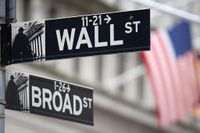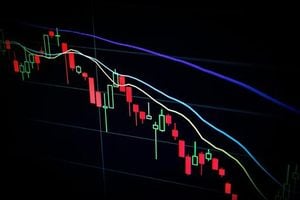On April 16, 2025, Business Today TV announced the launch of a new market show titled "Daily Calls," designed to provide viewers with expert insights and clarity on market queries through live sessions with seasoned analysts. This initiative aims to assist individuals who may be uncertain about investment strategies and portfolio management.
In the broader financial landscape, European equities experienced a modest decline, with the Stoxx Europe 600 Index closing down 0.2%. This dip snapped a two-day winning streak, though the index managed to recover from an earlier 1.4% slide. The recovery was partly fueled by China's indication that it might be open to trade talks if the Trump administration adopts a more consistent position and curbs disparaging remarks from cabinet members.
On the technology front, Nvidia Corp. faced significant challenges as the U.S. barred the company from selling its H20 AI chip in China. This restriction sent Nvidia's stock plummeting by over 7.40%, with the company warning investors of a $5.5 billion hit due to the government's decision. The broader tech sector felt the impact, with other chipmakers like Advanced Micro Devices (AMD) also reporting declines. AMD’s shares fell by 6.33% after the company indicated it would incur a charge of up to $800 million as a result of the new export restrictions.
Fitch Ratings has revised its global growth forecast, predicting the weakest expansion since 2009, excluding the pandemic's effects. The agency forecasts that world growth will dip below 2% this year, with specific reductions in growth expectations for 2025 by 0.4 percentage points. For the U.S., Fitch anticipates that annual growth will remain positive at 1.2% but will decelerate sharply to just 0.4% year-on-year by the final quarter of the year. Meanwhile, China's growth is expected to remain below 4% for both this year and the next, while the eurozone struggles to maintain growth above 1%.
As the markets reacted to these developments, the Dow Jones Industrial Average fell by 223.66 points, or 0.55%, settling at 40,145.30. The Nasdaq Composite dropped sharply by 348.94 points, or 2.07%, to 16,474.23, while the S&P 500 Index decreased by 64.01 points, or 1.19%, to 5,332.62. These declines were attributed to investor apprehension surrounding the tech sector's outlook, especially after Nvidia's stark warning regarding its financial performance.
In a related context, Fed Chair Jerome Powell is set to address the U.S. economy at 1:30 p.m. EDT (1730 GMT) on the same day, with investors eagerly awaiting insights on U.S. tariff policies and inflation expectations. Powell's speech comes at a critical time, as the Federal Reserve is scheduled to make its next rate decision in early May.
Meanwhile, commodities showed some positive movement, with Brent Crude Oil rising by 1.59% to reach $65.70. Gold prices also increased by 3.09% to $3,318.10, while copper saw a modest rise of 0.58%, priced at $844.35. CBOT Soybeans inched up slightly by 0.07%, settling at $1,036.75.
In Canada, the Bank of Canada released a scenario indicating that if U.S. tariffs trigger a global trade war, inflation in the country could spike, leading to a significant recession. The central bank did not issue its regular quarterly economic forecasts due to the high level of uncertainty but provided two scenarios regarding potential outcomes. In the first, most tariffs are negotiated away, leading to a temporary weakening of Canadian and global growth. In the second, a long-lasting trade war would result in inflation surging above 3% by mid-2026 before returning to the bank’s 2% target.
The U.S. housing market reflected a slight uptick in builder confidence, with a gauge from the National Association of Home Builders and Wells Fargo rising by 1 point to 40 in April. However, expectations for sales in the next six months slipped to their lowest level since November 2023, highlighting ongoing concerns over construction material prices amid rising tariffs.
As the day unfolded, President Donald Trump engaged in negotiations with top economic advisers regarding tariffs and trade with a Japanese official visiting the White House. The discussions come amid heightened tensions between the U.S. and its trading partners, particularly concerning the EU, which is preparing for more tariffs despite previous negotiations.
In the aftermath of President Trump's trade policies, the Stellantis NV assembly plant in Windsor, Ontario, has been temporarily closed, marking a significant disruption in Canada’s auto industry. The closure reflects the ripple effects of the 25% tariffs imposed on imported vehicles, with other cities likely to face similar challenges.
Overall, the financial landscape on April 16, 2025, is marked by a mix of cautious optimism and looming uncertainties. With ongoing trade negotiations and market reactions to tech sector challenges, investors are left to navigate a complex environment as they await further developments.





